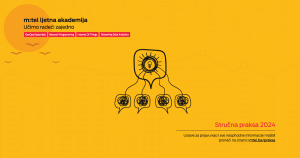SARAJEVO, October 13 (FENA) - Over the last decade, across the globe we have witnessed the devastating effects of disasters. Storms, floods, earthquakes, droughts and diseases can reverse development gains in the blink of an eye. The disaster loss data speak for itself. Unfortunately, unsustainable development, a lack of preparedness and ex post actions to disasters continue to entrench poverty, erode livelihoods and increase the vulnerability of people and communities to disasters, Sukhrob Khoshmukhamedov, UNDP Deputy Resident Representative in Bosnia and Herzegovina, wrote in his op-ed.
Khoshmukhamedov said that in a volatile, uncertain, complex, interconnected and ambiguous world disaster risks present a highly challenging and ambitious problem.
"Climate change affects populations and communities worldwide through changes in mean climate and extreme disaster events and their subsequent impact on natural and human systems. The United Nations estimates that around 26 million people are pushed into poverty each year because of extreme weather events, 90 per cent of which are linked to climate change. The aftermath of disasters proves that we must act further and faster and make our development efforts risk-informed and climate-smart," he stated.
Looking at COVID-19 in isolation offers proof of how the sudden onset of a disaster can over a short period transform and have global consequences. COVID-19 has transformed into a global pandemic causing an unprecedented shock that has taken the world, its economies and population by surprise and causing many countries to come to a standstill, including Bosnia and Herzegovina. Throughout the first response to COVID-19, countries reacted differently yet had to tackle the crisis in a coordinated manner in order to plan efficiently and deliver and communicate steps and measures not only to contain the transmission of the virus and support the healthcare systems but also to shape the socioeconomic recovery.
"Bosnia and Herzegovina was one of the first countries in the region to introduce initial measures to contain the transmission of the virus. However, the COVID-19 crisis exacerbated and exposed the existing deficiencies and challenges at a different level of authorities. This is visible through the unclear coordination and communication systems, including legal responsibility for disaster management at various levels of government, insufficient strategic frameworks and the failure of inadequate civil protection programmes and capacities," he emphasized.
Khoshmukhamedov stated that Bosnia and Herzegovina is still learning that it is not possible to divide the risk of disasters and the response to disasters into sectors or one level of government entrusted with disaster management and ensuring health and social protection services as is currently the case. In 2014, the country experienced severe consequences from floods that affected around 70,000 hectares of arable land and caused more than 50 local governments to experience near total devastation of their service infrastructure and economic losses exceeding USD 1.5 billion accounting for around 15 per cent of GDP.
"The recession precipitated by the COVID-19 crisis is expected to be far more severe than any previous recession and therefore it is anticipated that the economy in Bosnia and Herzegovina will experience its consequences for at least the next couple of years. The COVID-19 crisis will have a tremendous impact on the quality of life of people and families, particularly the unemployed, single headed households, children and persons with disabilities and people living on or under the poverty line. For those who lack interest in disasters this crisis is a huge opportunity for them to understand the role that disaster risk reduction plays in ensuring economic growth and development and the well-being of people," he stated.
Disaster response, including prevention of the spread of COVID-19, needs to encompass the extensive socioeconomic impact that disasters have on people and businesses. In order to achieve it is needed to introduce inclusive and strengthened institutions across all sectors ranging from health and civil protection to labour market institutions, centres for social welfare and schools in order to respond in a coordinated manner and build the resilience of society, improve effective coordination and information management, which is an area that continues to be the main obstacle to effective management of disaster risks in Bosnia and Herzegovina, as well as upgrade the capacities of the civil protection, health, social protection and education sectors and other sectors at the local level that have been proven to be insufficient and extremely stretched from the onset of the disaster.
He believes that Bosnia and Herzegovina needs to develop a disaster risk reduction (DRR) system based on a multi-sector approach, strong vertical and horizontal inter-institutional coordination, modern tools, technologies and know-how. DRR should be integrated into development strategies and programmes and this followed by proper investment in prevention and preparedness. It will not be possible to achieve sustainable economic recovery unless these preconditions are fulfilled.
"UNDP in Bosnia and Herzegovina has strong emergency response, recovery and resilience building experience gained during the devastating floods of 2014 as well as through the ongoing response to the COVID-19 disaster. Since the onset of the COVID-19 crisis, UNDP has supported all levels of government through the procurement of emergency medical equipment and supplies and coordination of overall emergency response assistance. Unfortunately, the situation with the COVID-19 pandemic in the country shows that further support is required," said UNDP Deputy Resident Representative in BiH.
In 2019, United Nations agencies launched the joint Government of Switzerland and United Nations programme ‘Reducing Disaster Risk in Bosnia and Herzegovina for Sustainable Development’. The Government of Switzerland finances the programme, which is implemented by UNDP, UNICEF, UNFPA, UNESCO and FAO. The joint Swiss and United Nations DRR programme supports the most vulnerable categories and 10 high-risk local communities in preparing and adapting to the risks of disasters in different sectors.
He said that the aim is to build strong local ownership and leadership of the DRR process. To supplement this initiative, the response supports governments at the cantonal, entity and state level to build multi-sector capacities to ensure better disaster preparedness and management focused on public health related disasters.
"Although the road ahead of us is long we all have a responsibility to work continually on building resilience, to learn from previous experience and to utilise the knowledge we possess to reduce the effects of future disasters. As part of the United Nations response, UNDP together with donors and partners will continue to provide much needed assistance," concluded Khoshmukhamedov.
(FENA) A. B.









